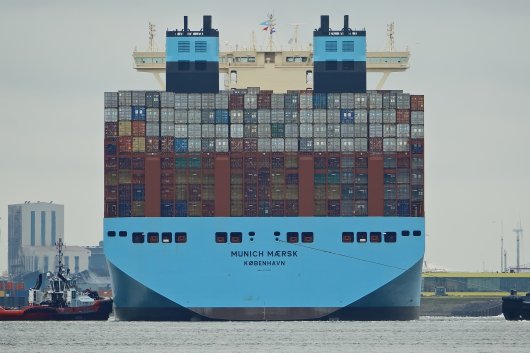Maersk sets zero CO2 emission target by 2050
'We cannot do this alone': Box shipper calls for robust industry involvement.
A.P. Moller - Maersk announced on Wednesday that it aims to reach carbon neutrality by 2050 and to have carbon-neutral vessels commercially viable by 2030 as part of its long-term strategy.
The world's biggest shipping line and bunker-buying shipowner observes that as world trade - and thereby shipping volumes - continue to increase, efficiency improvements on current fossil-based technology will only be able to keep shipping emissions at current levels, but not reduce them significantly or eliminate them.
As a result, according to COO Soren Toft, the only way to decarbonise the shipping industry will be "by fully transforming to new carbon neutral fuels and supply chains".
Therefore, with just over 30 years to go before 2050 - and given that the lifetime of a vessel is 20-25 years - Maersk is now calling for strong industry involvement to begin developing the vessels of the future.
"The next 5-10 years are going to be crucial. We will invest significant resources for innovation and fleet technology to improve the technical and financial viability of decarbonised solutions. Over the last four years, we have invested around USD 1bn and engaged 50+ engineers each year in developing and deploying energy efficient solutions. Going forward we cannot do this alone," Toft explained.
Next year, Maersk says it plans to initiate dialogue with third parties to tackle the issue of climate change.
"Research & Development is key to take the industry away from today's fossil based technology and by setting this ambitious target, Maersk hopes to generate a pull towards researchers, technology developers, investors, cargo owners and legislators that will activate strong industry involvement, co-development, and sponsorship of sustainable solutions that we are yet to see in the maritime industry," Maersk stated.
The Danish container line noted that it has managed to reduce its relative CO2 emissions by 46 percent compared to a 2007 baseline - around 9 percent better than the industry average.
The world's biggest shipping line and bunker-buying shipowner observes that as world trade - and thereby shipping volumes - continue to increase, efficiency improvements on current fossil-based technology will only be able to keep shipping emissions at current levels, but not reduce them significantly or eliminate them.
As a result, according to COO Soren Toft, the only way to decarbonise the shipping industry will be "by fully transforming to new carbon neutral fuels and supply chains".
Therefore, with just over 30 years to go before 2050 - and given that the lifetime of a vessel is 20-25 years - Maersk is now calling for strong industry involvement to begin developing the vessels of the future.
"The next 5-10 years are going to be crucial. We will invest significant resources for innovation and fleet technology to improve the technical and financial viability of decarbonised solutions. Over the last four years, we have invested around USD 1bn and engaged 50+ engineers each year in developing and deploying energy efficient solutions. Going forward we cannot do this alone," Toft explained.
Next year, Maersk says it plans to initiate dialogue with third parties to tackle the issue of climate change.
"Research & Development is key to take the industry away from today's fossil based technology and by setting this ambitious target, Maersk hopes to generate a pull towards researchers, technology developers, investors, cargo owners and legislators that will activate strong industry involvement, co-development, and sponsorship of sustainable solutions that we are yet to see in the maritime industry," Maersk stated.
The Danish container line noted that it has managed to reduce its relative CO2 emissions by 46 percent compared to a 2007 baseline - around 9 percent better than the industry average.

|
Swedish biomethane bunkered in Gothenburg
Test delivery performed by St1 and St1 Biokraft, who aim to become large-scale suppliers. |
|
|
|
||

|
Cockett to be closed down after 45 years
End of an era as shareholders make decision based on 'non-core nature' of Cockett's business. |
|
|
|
||

|
Petrobras confirms prompt availability of VLS B24 at Rio Grande
Lead time for barge deliveries currently five days. |
|
|
|
||

|
IMO approves pricing mechanism based on GHG intensity thresholds
Charges to be levied on ships that do not meet yearly GHG fuel intensity reduction targets. |
|
|
|
||

|
VARO Energy expands renewable portfolio with Preem acquisition
All-cash transaction expected to complete in the latter half of 2025. |
|
|
|
||

|
NYK trials biofuel in milestone coal carrier test
Vessel is used to test biofuel for domestic utility company. |
|
|
|
||

|
H-Line Shipping orders LNG bunkering vessel
Vessel with 18,000-cbm capacity to run on both LNG and MDO. |
|
|
|
||

|
How to engineer and manage green shipping fuels | Stanley George, VPS
Effective management strategies and insights for evolving fuel use. |
|
|
|
||

|
Swedish government bans scrubber wastewater discharges
Discharges from open-loop scrubbers to be prohibited in Swedish waters from July 2025. |
|
|
|
||

|
MAN Energy Solutions achieves 100% load milestone for ammonia engine
Latest tests validate fuel injection system throughout the entire load curve. |
|
|
|
||

